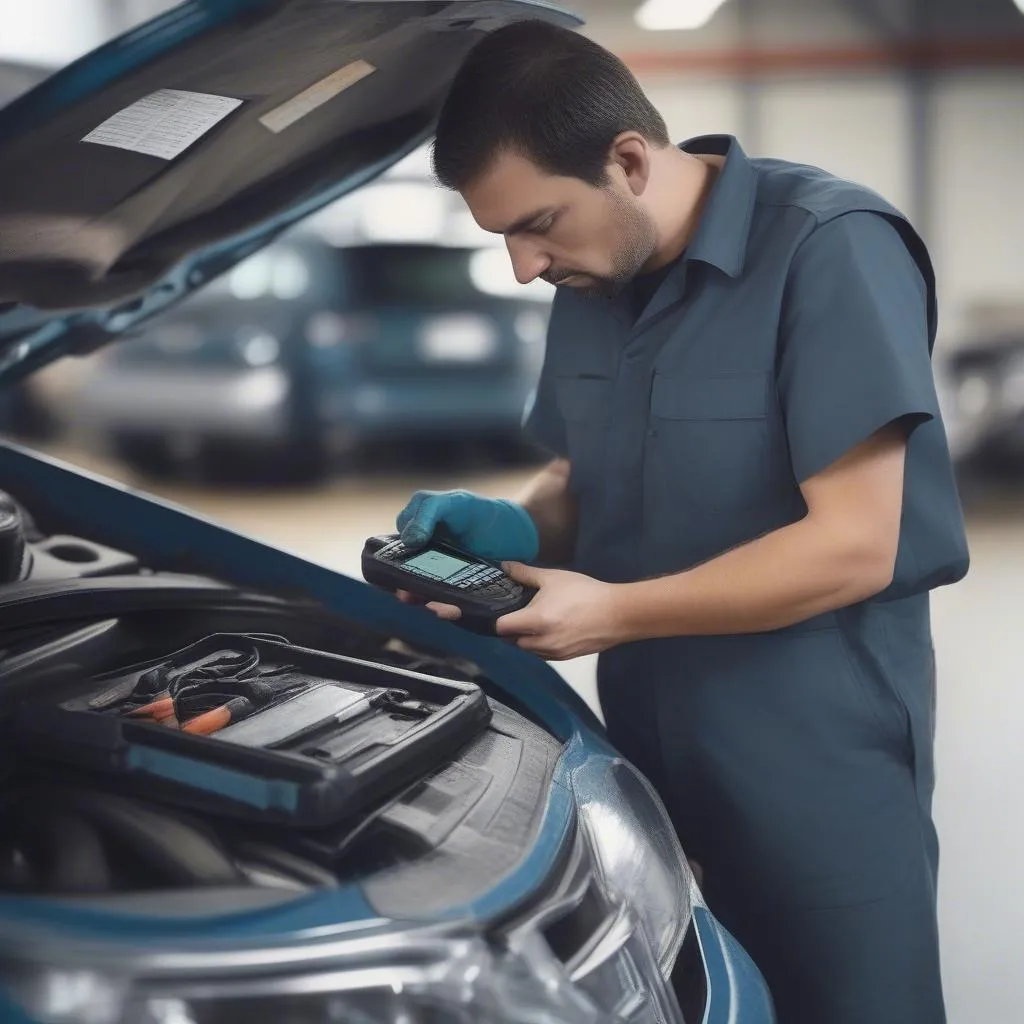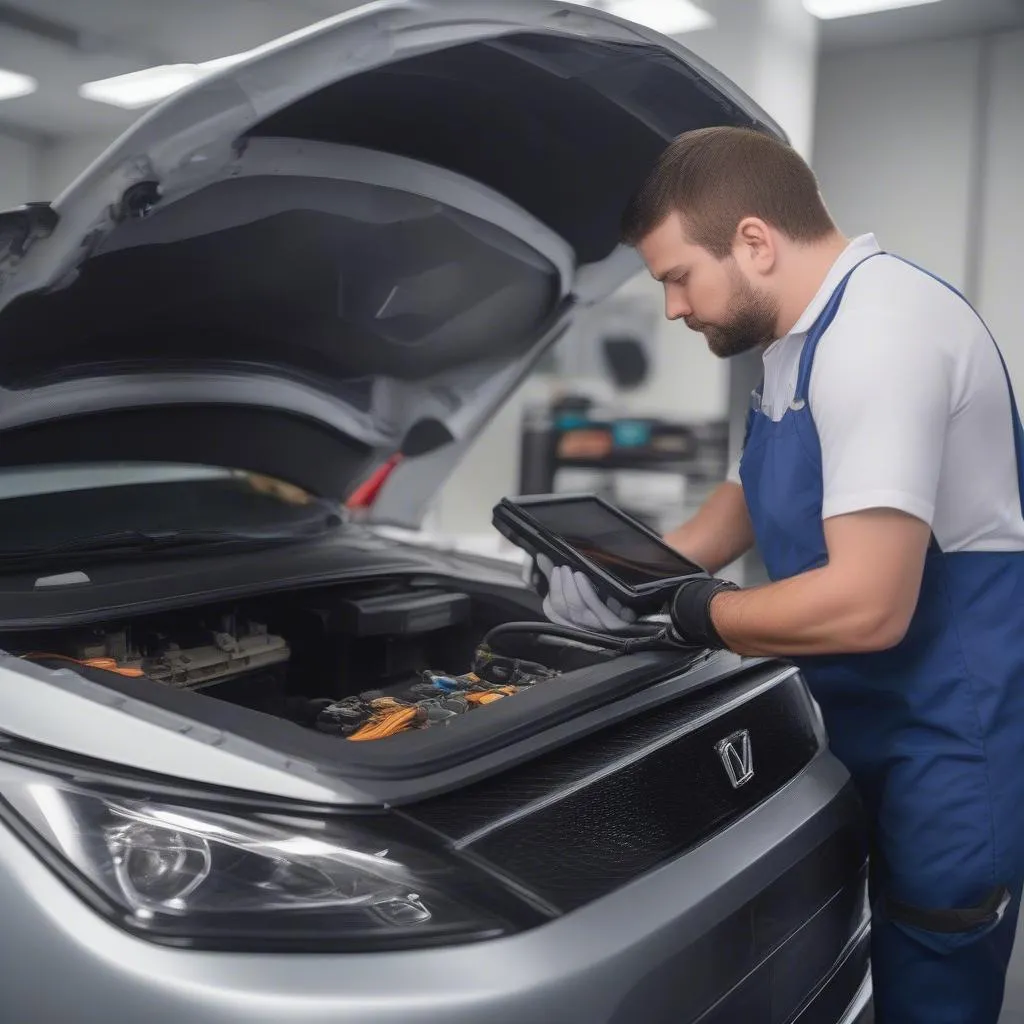Have you ever been driving down the road, enjoying your favorite tunes, when suddenly your car’s check engine light starts flashing? It’s enough to make anyone’s heart skip a beat, right? You might be thinking, “What’s wrong with my car?” or “How much will it cost to fix?” Well, you’re not alone. Millions of drivers experience this every year.
What Does a Check Engine Light Diagnostic Mean?
A check engine light diagnostic involves using a specialized tool, like a Dealer Scanner for European Cars, to read the codes stored in your car’s computer. These codes tell the mechanic exactly what’s wrong with your car. Think of it like your car’s own personal doctor – it’s a crucial step in determining the root of the issue and knowing how to fix it.
How Much Does a Check Engine Light Diagnostic Cost?
The cost of a check engine light diagnostic can vary depending on several factors:
- The location: The cost of living in a particular area can affect the price of services, including car diagnostics. If you live in a big city, you might expect to pay a bit more than someone living in a smaller town.
- The make and model of your car: Certain car brands or models might require specialized tools or diagnostic equipment, which can increase the cost. For example, a diagnostic for a high-end luxury car like a Mercedes-Benz or a BMW might cost more than a diagnostic for a more common car like a Toyota or Honda.
- The mechanic’s experience and reputation: Some mechanics might charge more for their services due to their expertise and experience, while others might offer more affordable rates. It’s always a good idea to ask about the mechanic’s credentials and previous experience.
- The severity of the problem: In some cases, a simple check engine light diagnostic might reveal a minor issue that can be easily resolved. However, if the problem is more serious, the mechanic might need to perform additional tests and diagnostics, which could increase the cost.
Understanding Check Engine Light Diagnostics: It’s More Than Just a Light
Imagine this: You’re driving your car on a beautiful summer day, the windows are down, and you’re enjoying the fresh air. Suddenly, the check engine light pops on. Your first instinct is to pull over and panic, wondering if your car will just completely break down. But don’t worry, it’s not always as dramatic as it seems.
The check engine light is designed to alert you to a potential problem, but it doesn’t always mean a major issue. Sometimes, a simple diagnostic can reveal a minor issue, like a loose gas cap, that can be easily resolved.
But let’s say you bring your car into a mechanic and the diagnostic reveals a serious problem. In that case, the mechanic can then determine what repairs are needed and provide you with a quote.
What If the Problem Is More Serious?
If the check engine light diagnostic reveals a major issue, you’ll want to get it fixed as soon as possible. Ignoring a serious problem could lead to more costly repairs in the long run.
For example, if you have a problem with your catalytic converter, it could affect your car’s emissions and lead to environmental issues. In some states, there are fines for driving with a damaged catalytic converter, and it’s also not good for the environment.
Check Engine Light Diagnostic: Common Questions
Here are some common questions that people ask about check engine light diagnostics:
- How do I know if I need a check engine light diagnostic?
If your check engine light is on, it’s a good idea to get it checked by a mechanic, even if your car seems to be running fine.
- What are the common reasons for a check engine light?
There are many reasons why your check engine light might come on, but some common culprits include:
-
A loose gas cap: This might seem like a minor issue, but it can trigger the check engine light and lead to more serious problems if not addressed.
-
Faulty oxygen sensors: These sensors monitor the exhaust and ensure that your engine is running efficiently.
-
Clogged catalytic converter: This can cause your car to run poorly and can also trigger the check engine light.
-
What is the difference between a check engine light diagnostic and a general car inspection?
A check engine light diagnostic specifically focuses on the computer codes stored in your car’s engine control unit (ECU). A general car inspection is more comprehensive and includes checking other components of your car, such as brakes, tires, and lights.
- Is a check engine light diagnostic the same for all cars?
No, the check engine light diagnostic process can vary depending on the make and model of your car. Some cars have more advanced computer systems that require specialized diagnostic tools. For example, a Dealer Scanner for European Cars is specifically designed to work with European car brands.
- How often should I get a check engine light diagnostic?
If your check engine light comes on, it’s best to get it checked as soon as possible. However, even if your check engine light is off, it’s still a good idea to have your car inspected regularly, especially if you’re driving an older car.
Check Engine Light Diagnostic: Don’t Panic, Get It Checked
Remember, a check engine light doesn’t always mean a major problem. Get a professional diagnosis, and you’ll be back on the road in no time.
 Check Engine Light Diagnostic
Check Engine Light Diagnostic
 Dealer Scanner for European Cars
Dealer Scanner for European Cars
Need Help With Your Check Engine Light?
If you’re experiencing a check engine light and need help with a diagnostic, don’t hesitate to contact us. We’re here to help!
WhatsApp us at +84767531508 for professional advice and support.
We are happy to assist you in setting up the necessary diagnostic software for your vehicle. Our team of experts can provide you with the best possible solution, ensuring your car is in top condition!